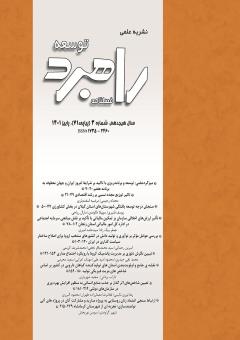بررسی عوامل مؤثر بر نوآوری و تولید دانش در کشورهای منتخب اروپا برای اصلاح ساختار سیاست¬گذاری در ایران
محورهای موضوعی :اسرین رحمانی 1 , سید محمدباقر نجفی 2 , محمد شریف کریمی 3
1 - دانشگاه رازی کرمانشاه
2 - ت
3 - استادیار
کلید واژه: واژگان کلیدی: تحقیق و توسعه, نوآوری, مخارج آموزش, فناوری اطلاعات و ارتباطات,
چکیده مقاله :
در الگوی تولید دانش بنیان، دانش و نوآوری مهم ترین عوامل تولید هستند لذا تولید دانش و نوآوری کلید اصلی رشد و توسعۀ اقتصادی به شمار می آید. فرایند تولید دانش و نوآوری نیازمند بسترسازی است؛ در این مقاله به بررسی میزان تأثیر سه عامل، مخارج حوزۀ تحقیق و توسعه، آموزش و همچنین زیرساخت فناوری اطلاعات و ارتباطات بر تولید دانش و نوآوری پرداخته می شود. هدف شناسایی عوامل مؤثر بر تحقق اقتصاد دانش بنیان به منظور سیاست گذاری برای تحقق آن در اقتصاد ایران است. میزان حق امتیازهای انحصاری به عنوان شاخصی برای تولید دانش و نوآوری در نظر گرفته شده است. کشورهای مورد مطالعه در این مقاله بیست و سه کشور منتخب عضو سازمان همکاری و توسعه اقتصادی هستند. برای مدل سازی از روش پانل دیتا استفاده شده است. دست یابی به یک رابطۀ مثبت و معنادار میان سه متغیر مخارج حوزه تحقیق و توسعه، آموزش و زیرساخت فناوری با میزان حق امتیازهای انحصاری، از نتایج این پژوهش می-باشد. نتایج برآوردها نشان می دهند که این سه عامل اهمیت بسزایی در فرایند تولید دانش و نوآوری دارند، به گونه ای که عدم توجه به آن ها عملا تولید دانش و نوآوری را با موانع جدی روبرو خواهد کرد. همچنین مقایسه میان نمودارهای توصیفی داده های مربوط به این سه متغیر برای ایران و کشورهای منتخب گویای عدم برقراری شرایط مطلوب در ایران می باشد.
In the model of Knowledge-Based production, knowledge and innovation are the most important factors of production; therefore, knowledge and innovation are the main keys to economic growth and development. The process of production of knowledge and innovation require groundwork making; This paper examines the effect of three factors, research and development expenditures, and education expenditures also the infrastructure of information and communication technology, on the production of knowledge and innovation. The purpose is to identify the path to realization of the knowledge-based economy in order to policy making for its realization in the Iranian economy. The extent of patents is considered as an indicator for producing knowledge and innovation. The countries under this study are 23 OECD member selected countries. For modeling, panel data method in Eviews software is used. Finding a positive and meaningful relationship between the three variables of research and development expenditure, training and technology infrastructure with the amount of patents, is the result of this research. The results of the calculations show that these three factors are very important in the process of producing knowledge and innovation, such that the lack of attention to them will actually lead the production of knowledge and innovation to the serious obstacles. Also, the comparison between the descriptive charts of the data for these three variables for Iran and the selected countries suggests that it would not be desirable in Iran.
